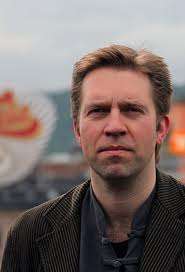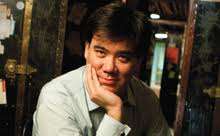|
Back
Transcendental Chutzpah New York
Avery Fisher Hall, Lincoln Center
09/19/2012 - & September 20, 22, 23, 2012
György Kurtág: ...quasi una fantasia..., Opus 27 No. 1
Ludwig van Beethoven: Piano Concerto No. 3 in C minor, Opus 37
Igor Stravinsky: Le Sacre du printemps
Leif Ove Andsnes (Piano)
New York Philharmonic Orchestra, Alan Gilbert (Music Director/Conductor)

L. O. Andsnes
It takes chutzpah to start the 2012-2013 New York Philharmonic season with a stage virtually empty. And to finish the program with a stage jam-packed from proscenium to proscenium with every conceivably orchestral musician.
Adding to the audacity, opening was mystical, prayerful, dreams, space, a child’s melody, while the closing piece embraced blood, sacrifice, mass fornication, savage fighting and (implied off-stage) cannibalism as well.
In other words, Alan Gilbert, the unassuming Music Director who has quietly revolutionized the Phil, started with transcendental chutzpah and finished with the barks of primitive aggression.
Back to those bookends in a minute. For the centerpiece of this concert was hardly controversial. It was joy. It was Leif Ove Andsnes playing Beethoven’s own centerpiece concerto, the Third. Like Aimard and Kremer, Mr. Andsnes can play the most outré avant-garde music with ease. Yet for his mainstream composers, Mr. Andsnes, like those colleagues, is stylish, committed, totally fresh.
It was that freshness which the Norwegian pianist projected. The opening Allegro con brio was pure youthful brio, Mr. Andsnes almost ebullient, with a quasi-Mozartean childish joy in the piano. Joy until the cadenza. And had he played only Beethoven’s cadenza, the evening would have been a success.
No writer dares explain how Mr. Andsnes can give a violin-like fluidity, such a transparency, such...well, élan to a piece which stands on the cusp of Classical and Romantic?
That wasn’t the end. The Largo was not the least bit desolate. Mr. Andsnes didn’t exactly press down the keys. He caressed them, and like a fantasy scientist, breathed on them to give them life. The finale was played with high spirits and a bouncing joy.
This wasn’t his first appearance. The opening work had a virtually empty stage except for one conductor (Alan Gilbert), one timpanist (Markus Rhoten) and one piano-player (yes, Leif Ove Andsnes). This was an illusion, though, for groups of the New York Philharmonic were way in the back of the auditorium, with a few n the balcony. This, György Kurtág’s ...quasi una fantasia..., was the spatial equivalent of a special occasion.
Kurtág’s short pieces have been compared to the music of Webern, but I see a more literary connection, those of Kafka’s short stories. Unlike Webern, he does not aim for brevity, he simply puts down music which, like Kafka, isn’t quite logical but reaches behind logic to something more primordial. The opening slow slow scales by the piano and parts of the orchestra in ...quasi una fantasia... are like a flambeau-bearing guidet leading us into an Egyptian tomb. The last movement is like a child’s tune gone awry. In the middle is are touches of nightmare, a tinge of meditation.
The Kurtág is unexplainable, but Mr. Andsnes has that deep understanding and digital invention to sustain the mood.

A. Gilbert (© Chris Lee)
Onto more blatant mysteries.
Far from me to accuse Mr. Gilbert of cheating. But May, 2013, is the 100th anniversary of the first performance of Stravinsky’s Rite of Spring, and every orchestra in the world will be celebrating that evening of shouting and walkouts.
Alan Gilbert, though, is a New Yorker. He moved ahead of the opening whistle (or bassoon) by playing Rite six months before the mass of Rites which will deafen the world, And the result is that, after 99 years and six months, Stravinsky’s ballet still is the most literally unique work in musical history.
True, nobody hissed, no countesses banged neighbor’s heads with handbags, no bearded Frenchmen cried out ”Fou! Imbécile!!” last night. However, two elderly ladies separately left their seats and staunchly walked out. The tradition lives quietly on.
After this galvanizing show, it was evident that Rite is more unique in the history of music than anything ever written. It had no precedent, and has no sequels. It is still ageless, startling, more dissonant than anything piece of the 20th Century, more rhythmically dynamic than any ballet ever written.
Mr. Gilbert has the orchestra to give it life. He plunged ahead with the virgin dances, the tribal rivalries. The drums beat, the trumpets barked, the winds howled.
Europe’s political complacency may have been jolted by the Great War the following year. But music’s century Darwinian “progress” was turned on its head by this work. Neither music (nor, alas, Igor Stravinsky) ever got better than this. Mr. Gilbert, in his audacity, did the orchestra proud.
Harry Rolnick
|